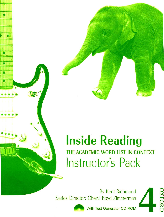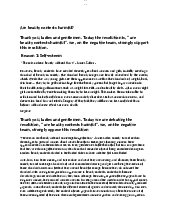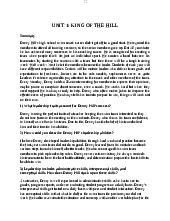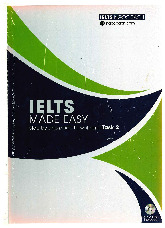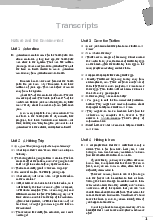







Preview text:
lOMoARcPSD|46342985 lOMoARcPSD|46342985
Lesson 6 Modern English Period
Early Modern English (circa 1500 - circa 1800) (Mastin, 2011)*
The Great Vowel Shift
Great Vowel Shift continued and as a result of which long vowel sounds began to be
made higher and further forward in the mouth.
The causes of the shift are still highly debated, although an important factor may
have been the very fact of the large intake of loanwords from Romance languages [like French, Italian, and Spanish].
Chaucer’s word lyf (pronounced “leef”) became the modern word life, and the word
five (originally pronounced “feef”) gradually acquired its modern pronunciation [/faIv/].
The Great Vowel Shift gave rise to many of the oddities of English pronunciation,
and now obscures the relationships between many English words and their foreign
counterparts. The spellings of some words changed to reflect the change in pronunciation
(e.g. stone from stan, rope from rap, dark from derk, barn from bern, heart from herte, etc).
Other changes in spelling and pronunciation also occurred during this period. The
Old English consonant X - technically a “voiceless velar fricative”, pronounced as in the
“ch” of loch or Bach - disappeared from English, and the Old English word burX (place), for
example, was replaced with “-burgh”, “-borough”, “-brough” or “-bury” in many place
names. In some cases, voiceless fricatives began to be pronounced like an “f” (e.g. laugh,
cough). Many other consonants ceased to be pronounced at all (e.g. the final “b” in words
like dumb and comb; the “l” between some vowels and consonants such as half, walk, talk and
folk; the initial “k” or “g” in words like knee, knight, gnaw and gnat; etc). As late as the
18th Century, the “r” after a vowel gradually lost its force, although the “r” before a vowel
remained unchanged (e.g. render, terror, etc), unlike in American usage where the “r” is fully pronounced.
The next wave of innovation in English vocabulary came with the revival of
classical scholarship known as the Renaissance. The English Renaissance roughly covers
the 16th and early 17th Century (the European Renaissance had begun in Italy as early as the
14th Century), and is often referred to as the “Elizabethan Era” or the “Age of
Shakespeare” after the most important monarch and most famous writer of the period. The
additions to English vocabulary during this period were deliberate borrowings, and not the
result of any invasion or influx of new nationalities or any top-down decrees.
Latin (and to a lesser extent Greek and French) was still very much considered the
language of education and scholarship at this time, and the great enthusiasm for the classical
languages during the English Renaissance brought thousands of new words into the language,
peaking around 1600. A huge number of classical works were being translated into English
during the 16th Century, and many new terms were introduced where a satisfactory English equivalent did not exist. lOMoARcPSD|46342985
Words from Latin or Greek (often via Latin) were imported wholesale during this period, either intact
(e.g. genius, species, militia, radius, specimen, criterion, squalor, apparatus, focus, tedium,
lens, antenna, paralysis, nausea, etc) or, more commonly, slightly altered (e.g. horrid,
pathetic, iilicit, pungent, frugal, anonymous, dislocate, explain, excavate, meditate, adapt,
enthusiasm, absurdity, area, complex, concept, invention, technique, temperature, capsule,
premium, system, expensive, notorious, gradual, habitual, insane, ultimate, agile, fictitious,
physician, anatomy, skeleton, orbit, atmosphere, catastrophe, parasite, manuscript, lexicon,
comedy, tragedy, anthology, fact, biography, mythology, sarcasm, paradox, chaos, crisis,
climax, etc). A whole category of words ending with the Greek-based suffixes “-ize” and “-
ism” were also introduced around this time.
Some scholars adopted Latin terms so excessively and awkwardly at this time that the
derogatory term “inkhorn” was coined to describe pedantic writers who borrowed the
classics to create obscure and opulent terms, many of which have not survived. Examples of inkhorn terms include:
revoluting, ingent, devulgate, attemptate, obtestate, fatigate, deruncinate, subsecive,
nidulate, abstergify, arreption, suppeditate, eximious, illecebrous, cohibit, dispraise and
other such inventions. Sydney Smith was one writer of the period with a particular penchant
for such inkhorn terms, including gems like:
frugiverous, mastigophorus, plumigerous, suspirous, anserous and fugacious.
However, it is interesting to note that some words initially branded as inkhorn
terms have stayed in the language and now remain in common use:
(e.g. dismiss, disagree, celebrate, encyclopaedia, commit, industrial, affability,
dexterity, superiority, external, exaggerate, extol, necessitate, expectation, mundane,
capacity and ingenious).
The 17th Century penchant for classical language also influenced the spelling of words
like debt and doubt, which had a silent “b” added at this time out of deference to their
Latin roots (debitum and dubitare respectively). For the same reason, island gained its silent
“s”, scissors its “c”, anchor, school and herb their “h”, people its “o” and victuals gained
both a “c” and a “u”.
By the end of the 16th Century, English had finally become widely accepted as a language of learning.
The Printing Press
The final major factor in the development of Modern English was the advent of the
printing press, one of the world’s great technological innovations, introduced into England
by William Caxton in 1476 (Johann Gutenberg had originally invented the printing press in
Germany around 1450). The first book printed in the English language was Caxton's own
translation, “The Recuyell of the Historyes of Troye”, actually printed in Bruges in 1473 or
early 1474. Up to 20,000 books were printed in the following 150 years, ranging from
mythic tales and popular stories to poems, phrasebooks, devotional pieces and grammars,
and Caxton himself became quite rich from his printing business (among his best sellers were
Chaucer’s “Canterbury Tales” and Thomas Malory’s “Tales of King Arthur”). As
mass-produced books became cheaper and more commonly available, literacy mushroomed,
and soon works in English became even more popular than books in Latin.At the time of the lOMoARcPSD|46342985
introduction of printing, there were five major dialect divisions within England - Northern,
West Midlands, East Midlands (a region which extended down to include London), Southern
and Kentish - and even within these demarcations, there was a huge variety of different
spellings. For example, the word church could be spelled in 30 different ways, people in 22,
receive in 45, she in 60 and though in an almost unbelievable 500 variations.
A good part of the reason for many of the vagaries and inconsistencies of English
spelling has been attributed to the fact that words were fixed on the printed page before any
orthographic consensus had emerged among teachers and writers.
As the Early Modern period progressed, there was an increased use of double vowels
(e.g. soon) or a silent final "e" (e.g. name) to mark long vowels, and doubled consonants to
mark a preceding short vowel (e.g. sitting), although there was much less consensus about
consonants at the end of words (e.g. bed, glad, well, glasse, etc). The letters "u" and "v",
which had been more or less interchangeable in Middle English, gradually became
established as a vowel and a consonant respectively, as did "i" and "j". Also during the 16th
Century, the virgule (an oblique stroke /), which had been a very common mark of
punctuation in Middle English, was largely replaced by the comma; the period or full-stop
was restricted to the end of sentences; semi-colons began to be used in addition to colons
(although the rules for their use were still unclear); quotation marks were used to mark direct
speech; and capital letters were used at the start of sentences and for proper names and important nouns.
Standardization was well under way by around 1650, but it was a slow and halting
process and names in particular were often rendered in a variety of ways. For example, more
than 80 different spellings of Shakespeare’s name have been recorded, and he himself
spelled it differently in each of his six known signatures, including two different versions in his own will!
[See the file entitled Lesson 6 The Six Signatures of William Shakespeare.]
Dictionaries and Grammars
The first English dictionary, “A Table Alphabeticall”, was published by English
schoolteacher Robert Cawdrey in 1604.
Cawdrey’s little book contained 2,543 of what he called “hard words”,
especially those borrowed from Hebrew, Greek, Latin and French, although it was not
actually a very reliable resource (even the word words was spelled in two different ways on
the title page alone, as wordes and words).
Several other dictionaries, as well as grammar, pronunciation and spelling guides,
followed during the 17th and 18th Century. The first attempt to list ALL the words in the
English language was “An Universall Etymological English Dictionary”, compiled by
Nathaniel Bailey in 1721 (the 1736 edition contained about 60,000 entries).
But the first dictionary considered anything like reliable was Samuel Johnson’s
“Dictionary of the English Language”, published in 1755, over 150 years after Cawdrey’s.
An impressive academic achievement in its own right, Johnson’s 43,000 word dictionary
remained the pre-eminent English dictionary until the much more comprehensive “Oxford lOMoARcPSD|46342985
English Dictionary” 150 more years later, although it was actually riddled with inconsistencies
in both spelling and definitions. Johnson’s dictionary included many flagrant
examples of inkhorn terms which have not survived, including:
digladation, cubiculary, incompossibility, clancular, denominable, opiniatry,
ariolation, assation, ataraxy, deuteroscopy, disubitary, esurine, estuation, indignate and
others. Johnson also deliberately omitted from his dictionary several words he disliked or
considered vulgar (including bang, budge, fuss, gambler, shabby and touchy), but these
useful words have clearly survived intact regardless of his opinions. Several of his definitions
appear deliberately jokey or politically motivated.
Since the 16th Century, there had been calls for the regulation and reform of
what was increasingly seen as an unwieldy English language, including John Cheke's 1569
proposal for the removal of all silent letters, and William Bullokar's 1580 recommendation of
a new 37-letter alphabet (including 8 vowels, 4 "half-vowels" and 25 consonants) in order to aid and simplify spelling.
But, by the early 18th Century, many more scholars had come to believe that the
English language was chaotic and in desperate need of some firm rules.
In addition to dictionaries, many English grammars started to appear in the 18th
Century, the best-known and most influential of which were Robert Lowth's “A Short
Introduction to English Grammar” (1762) and Lindley Murray's “English Grammar”
(1794). In fact, some 200 works on grammar and rhetoric were published between 1750 and
1800, and no less than 800 during the 19th Century. Most of these works, Lowth’s in
particular, were extremely prescriptive, stating in no uncertain terms the “correct” way of
using English. Lowth was the main source of such "correct" grammar rules as a double
negative always yields a positive, never end a sentence with a preposition and never split an infinitive.
Golden Age of English Literature
Between 1500 and 1650, an estimated
10,000-12,000 new words were coined, about half
of which are still in use today.
Up until the 17th Century, English was
rarely used for scholarly or scientific works, as it
was not considered to possess the precision or the
gravitas of Latin or French. Thomas More, Isaac
Newton, William Harvey and many other English
scholars all wrote their works in Latin.
A page from “Hamlet” from Shakespeare's First Folio from Hamlet
on the Ramparts, originally from Folger Shakespeare Library) lOMoARcPSD|46342985
[Watch the video on Original Pronunciation-Hamlet To be, or not to be... in the link
https://www.youtube.com/watch?v=qYiYd9RcK5M which was uploaded by Shakespeare on Toast (2014) to YouTube].
Over time, the rise of nationalism led to the increased use of the native spoken
language rather than Latin, even as the medium of intellectual communication.
Several generations of English writers during a golden age of English literature
include Edmund Spenser, William Shakespeare, John Donne, John Milton, John
Dryden, Andrew Marvell, Alexander Pope and many others.
William Shakespeare
Whatever the merits of the other contributions to this golden age, though, it is clear
that one man, William Shakespeare, single-handedly changed the English language to a
significant extent in the late 16th and early 17th Century.
He had a vast vocabulary (34,000 words by some counts) and he personally coined
an estimated 2,000 neologisms or new words in his many works, including, but by no means limited to
bare-faced, critical, leapfrog, monumental, castigate, majestic, obscene, frugal,
aerial, gnarled, homicide, brittle, radiance, dwindle, puking, countless, submerged, vast,
lack-lustre, bump, cranny, fitful, premeditated, assassination, courtship, eyeballs, ill-tuned,
hot-blooded, laughable, dislocate, accommodation, eventful, pell-mell, aggravate, excellent,
fretful, fragrant, gust, hint, hurry, lonely, summit, pedant, gloomy, and hundreds of other
terms still commonly used today.
He also introduced countless phrases in common use today, such as one fell swoop,
vanish into thin air, brave new world, in my mind’s eye, laughing stock, love is blind,
star-crossed lovers, as luck would have it, fast and loose, once more into the breach, sea cha nge,
there’s the rub, to the manner born, a foregone conclusion, beggars all description,
it's Greek to me, a tower of strength, make a virtue of necessity, brevity is the soul of wit,
with bated breath, more in sorrow than in anger, truth will out, cold comfort, cruel only to be
kind, fool’s paradise and flesh and blood, among many others.
[Because of these, the Early Modern English is also known as Shakespearean English.]
By the time of Shakespeare, word order had become more fixed in a subject-verb-
object pattern, and English had developed a complex auxiliary verb system, although to be
was still commonly used as the auxiliary rather than the more modern to have (e.g. I am
come rather than I have come). Do was sometimes used as an auxiliary verb and sometimes
not (e.g. say you so? or do you say so?). Past tenses were likewise still in a state of flux, and
it was still acceptable to use clomb as well as climbed, clew as well as clawed,
shove as well as shaved, digged as well as dug, etc. Plural noun endings had shrunk from the
six of Old English to just two, “-s” and “-en”, and again Shakespeare sometimes used one
and sometimes the other. The old verb ending “-en” had in general been gradually replaced
by “-eth” (e.g. loveth, doth, hath, etc), although this was itself in the process of being
replaced by the northern English verb ending “-es”, and Shakespeare used both (e.g.
loves and loveth, but not the old loven). lOMoARcPSD|46342985
A comparison of a passage from "King Lear" in the 1623 First Folio with the same
passage from a more familiar modern edition below gives some idea of some of the changes
that were still underway in Shakespeare's time:
Sir, I loue you more than words can weild Sir,
I love you more than word ye matter, can wield the matter,
Deerer than eye-sight, space, and libertie, Dearer than eyesight, space, and liberty,
Beyond what can be valewed, rich or rare, Beyond what can be valued, rich or rare,
No lesse then life, with grace, health, No less than life, with grace, health, beauty, honor: beauty, honour,
As much as Childe ere lou'd, or Father As much as childe e'er loved, or father found. found.
A loue that makes breath poore, and A love that makes breath poor and speech speech vnable, unable,
Beyond all manner of so much I loue you.
Beyond all manner of 'so much' I love you.
Other than the spellings of words such as weild, libertie, valewed and honor, the
most obvious differences from modern-day spellings are the continued transposition of "u"
and "v" in loue and vnable, and the trailing silent "e" in lesse, Childe and poore, both hold-
overs from Middle English and both in the process of transition at this time.
Thee, thou and thy (signifying familiarity or social inferiority, as in most European
languages today) were still very prevalent in Shakespeare’s time, and Shakespeare himself
made good use of the subtle social implications of using thou rather than thou. Thee and thou
had disappeared almost completely from standard usage by the middle of the 17th Century.
[See the file on Lesson 6 The Lord’s Prayer written in Old English, Middle English,
Early Modern English, and Late Modern English. It shows the stark differences in the
spelling of the words in the prayer.
Disclaimer: The intent for including The Lord’s Prayer in this lesson is NOT to
show irreverence/disrespect to the prayer or to Christians NOR to teach it to non-Christians,
but rather to point out or illustrate the evolution of spelling of the words over the course of
the long history of the English language.]
International Trade
While all these important developments were underway, British naval superiority
was also growing. In the 16th and 17th Century, international trade expanded immensely,
and loanwords were absorbed from the languages of many other countries throughout the
world, including those of other trading and imperial nations such as Spain, Portugal and the Netherlands. Among these were:
French (e.g. bizarre, ballet, sachet, crew, progress, chocolate, salon, duel, brigade,
infantry, comrade, volunteer, detail, passport, explorer, ticket, machine, cuisine, prestige,
garage, shock, moustache, vogue);
Italian (e.g. carnival, fiasco, arsenal, casino, miniature, design, bankrupt, grotto,
studio, umbrella, rocket, ballot, balcony, macaroni, piano, opera, violin);
Spanish (e.g. armada, bravado, cork, barricade, cannibal); lOMoARcPSD|46342985
Portuguese (e.g. breeze, tank, fetish, marmalade, molasses);
German (e.g. kindergarten, noodle, bum, dumb, dollar, muffin, hex, wanderlust,
gimmick, waltz, seminar, ouch!);
Dutch/Flemish ( e.g. bale, spool, stripe, holster, skipper, dam, booze, fucking, crap,
bugger, hunk, poll, scrap, curl, scum, knapsack, sketch, landscape, easel, smuggle, caboose,
yacht, cruise, dock, buoy, keelhaul, reef, bluff, freight, leak, snoop, spook, sleigh, brick, pump, boss, lottery);
Basque (e.g. bizarre, anchovy);
Norwegian (e.g. maelstrom, iceberg, ski, slalom, troll);
Icelandic (e.g. mumps, saga, geyser); Finnish (e.g. sauna);
Persian (e.g. shawl, lemon, caravan, bazaar, tambourine);
Arabic (e.g. harem, jar, magazine, algebra, algorithm, almanac, alchemy, zenith,
admiral, sherbet, saffron, coffee, alcohol, mattress, syrup, hazard, lute);
Turkish (e.g. coffee, yoghurt, caviar, horde, chess, kiosk, tulip, turban); Russian (e.g. sable, mammoth);
Japanese (e.g. tycoon, geisha, karate, samurai);
Malay (e.g. bamboo, amok, caddy, gong, ketchup);
Chinese (e.g. tea, typhoon, kowtow).
Polynesian (e.g. taboo, tatoo).
* Words were highlighted (or in bold) for emphasis. lOMoARcPSD|46342985 References
Mastin, L. (2011). The history of English: How English went from an obscure Germanic
dialect to a global language. https://www. thehistoryofenglish.com/
Old English and Middle English-Cn. (n. d.). http://web.cn.edu/kwheeler/documents/ OE_vs_ME.pdf
Shakespeare on Toast. (2014, November 25). Original Pronunciation-Hamlet To be, or not to
be... [Video]. YouTube. https://www.youtube.com/watch?v=qYiYd9RcK5M
The six signatures of William Shakespeare. (n. d.). https://www.troup.org/userfiles/929/ My
%20Files/ELA/HS%20ELA/10th%20ELA/10th%20Unit%203/The%20six%20si
gnatures%20Shakespeare.pdf?id=16435
